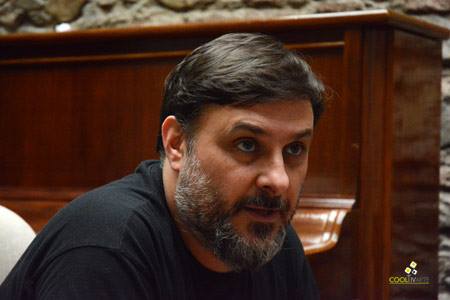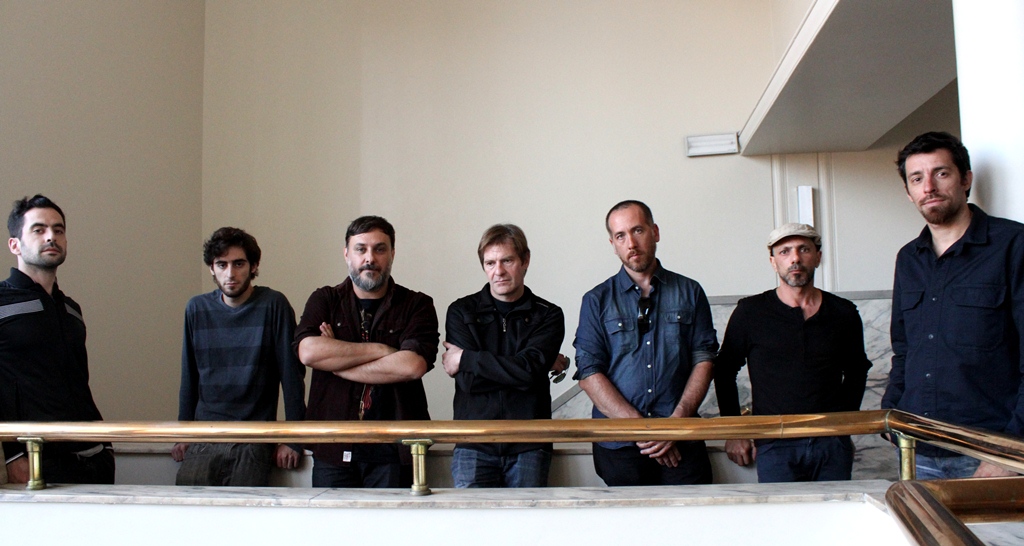(Pueden leer este artículo en español aquí)
After leaving an everlasting mark with El Peyote Asesino and in parallel with his collaborations with Bajofondo, Fernando Santullo delves on his solo career with “El Mar Sin Miedo” [The Fearless Sea]. The album will be officially presented in Uruguay in two months’ time, and the musician is also part of the line-up that will represent the country in this year’s SXSW Festival.
This is the interview that Santullo was kind enough to give me, prior to such activities.
Any musician who’s been part of a renowned band faces a serious risk when going solo: that of his central appeal becoming peripheral to what he’s doing, and that his audience will be but a group of people listening by inertia.
Your first studio album made the link you had with your current band explicit from its name (“Bajofondo Presenta Santullo”). Then, there was a live show that carried a very interesting temporal reference in its name: “Canciones Del Futuro Reciente” [Songs From The Recent Future]. And now, there comes this new album, and –for the first time– the title conveys something I felt there was missing before: freedom. And freedom as in the act of becoming detached from your own past, the one thing that can truly weigh a person down.
Is such an interpretation accurate?
Well, I think I was free when I made every single album I’ve ever released. Of course, when you’re part of a band you also have to deal with your mates. There’s a lot to settle and agree upon. But you also go through that when you’re a solo artist. There’s deals to be made with your producer, with your record company and so on. What must be understood is that just because you’re making a deal, that doesn’t mean you’re compromising anything. And making a deal is NOT like holding a battle with someone. That’s the way many musicians tend to see it, and (based on my personal experiences) such a viewpoint is not very realistic. It’s always up to you how much you want to concede, and if you don’t want to, then you can self-publish your album and handle its distribution yourself. That’s not the way I work. Maybe I have started to work more on my own when it comes to composing songs, but there comes a point when I always turn to other people for a different insight. Everything is richer when it becomes collective.
And as far as being free from my own past goes, I think that was never something I worried about. Which means I never thought if the album I was recording had to sound like El Peyote, or Bajofondo or whatever. The creative process has got a way of its own, and I don’t think it’s meant to be “controlled” or “ruled”. On the contrary, I like music to flow naturally, without such constraints. That doesn’t mean you won’t end up taking your songs down a specific path. Yet, you shouldn’t be worried about anything but letting the internal emotion and logic of the song coming to the fore.
And in “El Mar Sin Miedo” it was like that. It never mattered what “genre” the songs would fall into, the only thing that mattered was that the songs were my own, and that I fell in love with them.
You must fall in love with your songs, and feel like playing and singing them. That’s what truly counts.
Although El Peyote and Bajofondo are the bands which brought you the greatest prominence, there is another outfit that is worthy of some attention right now. It’s the band Cormoran – one that released just one song, called “Manada Negra” [Black Swarm]. And since that song was penned right as you were composing “El Mar Sin Miedo”, I think it’s worthy of a closer look.
You feel really in your element when singing “Manada Negra”, as if you were singing freed from any prejudice or preoccupation. Did composing such a song and singing it so leisurely added up to the experience that resulted in “El Mar Sin Miedo”?
Well, I think “Manada Negra” is on a different trip – it’s more of a “scientific metal” song. Anyway, the song was written with Sebastián Cobas, at the same time I was writing the bulk of the songs that ended up in “El Mar Sin Miedo”. So, it’s just natural that the song would feel close, even if the genres are unrelated. For me, it was a great opportunity to dabble on a sub-genre I’m really enthusiastic about, and that I been listening to for a long time. Seba came up with some pretty music, and all of us rounded up “Manada Negra”. It was really enjoyable.
Which songs on the album would you like to single out besides the ones that have already been issued as promotional cuts?
That’s a tricky question, is like asking you to pick a favorite from your baby boy and baby girl. First of all, I don’t know which songs will become singles besides the ones that are already out (“No Hay Vuelta” [No Turning Back] and “Lo Que Debo” [What I Must], with a music video directed by Guille Carbonell). And second, I like all songs on the album. I like “Pedalear” [Pedaling] because it’s weird and quite dense, and I like “Contraluz” [Backlighting] because it’s the exact opposite to “Pedalear”. I’m really fond of “El Martillo Azul” [The Blue Hammer] too, which is more of a broody number. What can I tell you? I like all of them. Otherwise, they wouldn’t be on the album.
Do you feel any of its songs bring to the light conflicts that were never examined in your discography before?
Conflicts? I don’t know… In fact, I’m unaware if the album brings any conflicts to the light, or simply assumes them. What I can tell you for sure is that I began singing more, and that’s a risk I undertook. I wouldn’t call it a conflict, but singing melodies is something I had never done before to such an extent.
Honestly, I find it difficult to see the songs in terms of the conflicts they bring forward. For the most part, I understand them on a more carnal level, more in terms of the concrete images they project than of the “concept” that should lie underneath. And how these images end up painting an even more complex picture. That’s when I realize what the song is all about.
But it doesn’t always work like that, and many times I don’t even think about it. To be frank, I hardly ever do.
And are there songs that you feel brings a closure to any kind of conflict that’s always been present in your life?
No.
I remember something you remarked the first time we talked, because I found it equally funny and worrying. When speaking about how difficult it can be for a musician to make a living, you pointed out that “I have been making music for 20 years, and sometimes even I have trouble making ends meet at the end of the month”. And one would have thought in your case it’d be different. So, in which ways do you think the audience/art relationship could be improved?
Well, there is a part which depends solely on you. And you must try to do your best when it comes to that. And then, there is a part which falls out of your range. And there is little you can do about it. I make such a distinction because turning music into a job is hard most of the time, and not just because you’re lazy or anything. It might be that your music is only of interest to a reduced group of people, and you’ll have to put up with that. Or that you live in Winnipeg, and the slew comes to town only twice a week. Or a hundred more factors. It won’t kill you, but you’ll have to create a different set of strategies. Or work as something else, which is actually what most musicians do. And that’s just fine. For instance, I have worked far more as a journalist than as a musician.
Yet, I have just no idea what could be done to improve the audience/art relationship.
And would you say that in contemporary art everything is legit? Or does the rule of “if everything is art, nothing is art” hold sway?
Gosh, this is getting trickier. I don’t feel entitled to speak about such things without boning up beforehand. I mean, these are not questions that I ask myself too often, so I don’t have any short or concrete answer to any of them. But I suppose that for something to be “art”, more than a concept is needed. There is also technique, and the skill that lets you apply such technique.
What about the official presentation of the album on April of this year at La Trastienda? Will the guests that play on the album be there?
Yes, many of them have already confirmed attendance. And some of the usual suspects might show up as well. The idea is to focus on the new album, and play the whole of it. And highlight a handful of earlier songs, of course.
You are also part of the Uruguayan delegation that is travelling to the SXSW Festival in Texas. Is it your first time playing the US? And how do you feel your music fits in the overall scheme of that delegation?
Indeed, it’s my first time playing the US. It’s very exciting, yet I’m well aware how difficult it is to stand out from such a crowd of bands and artists. I think the Uruguayan delegation has a markedly alternative aura to it, and (as such) Santullo blends in well there.
I wish you the best of lucks in this new instance of your career. And the final question is, now that you’re finally sailing upon a fearless sea: how many things would you say you have ever lost just because you were afraid of losing them in the first place?
Boy, you’re killing me with such philosophical questions. I find it hard to think in such terms. A person tends to rebuild his own history in a more or less lineal and coherent way. I think that’s a way to ensure one won’t go crazy. So, I find it difficult to make such an “external” balance when I have to look back. At any rate, I can tell for sure that I’d be a much better deal-maker.
Remember to check out Santullo’s website and his soundcloud profile for more information.


